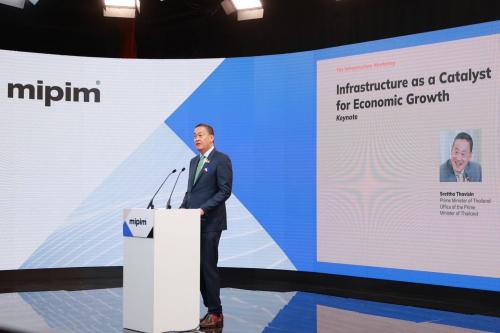Prime Minister and Minister of Finance Srettha Thavisin highlighted infrastructure development as a key priority for Thailand, saying that one of the central goals of the Thai government is to foster equality through economic growth, as it firmly believes that infrastructure is at the heart of enabling progress and access across all sectors of the economy.
The Prime Minister on 12 March 2024 attended the opening of MIPIM 2024, held on 12-15 March 2024 in Cannes, Republic of France. MIPIM (Marché International des Professionnels d'Immobilier) is the world's leading real estate market event.
On this occasion, he delivered an opening keynote at the seminar “Better Infrastructures in an Age of Risk, Scarcity, and Emergency,” sharing his vision and experience regarding infrastructure development.
The Prime Minister stated that the Thai government planned to turn Thailand into the main regional aviation hub within this decade. Geographically situated in the heart of Indochina, Thailand holds a strategic position, where major cities across Asia are within a four- to six-hour flight. With Bangkok alone welcoming over 60 million passengers annually, Thailand aspires to further expand its capacity to accommodate even more travelers. Plans are in place to expand existing airports and construct new ones. A notable project is the expansion of Suvarnabhumi International Airport to add new terminals and build two more runways. Once completed, the airport will be able to handle 150 million passengers yearly, more than double of what the airport can handle today.
Additionally, he said, Thailand will also build two new airports – one in the North and one in the South. The Lanna International Airport will serve as a second airport to the bustling tourism industry in Chiang Mai and other northern provinces. Meanwhile, the Andaman International Airport in Phang-nga, close to Phuket, will complement the long-haul hub in southern Thailand. Together, these new airports will accommodate an additional 40 million passengers annually.
In addition to new infrastructure, the Government also has plans to improve the services for every visitor who goes through the country’s airports. This includes the following:
- Improving ground operation processes and capacity to shorten the wait time for inbound and outbound passengers;
- Expanding and reallocating landing and take-off slots to make them more suitable and convenient for international passengers;
- Reducing landing fees and increasing delay fees to increase turnover and accommodate more flights;
- Improving safety standards for both ground operations and airside operations;
- Increasing flight frequency and new routes to Thailand, and much more.
Another mega project the Thai government is undertaking is the “Landbridge” project, the cornerstone of maritime connectivity in the Indo-Pacific. The Prime Minister emphasized a huge risk posed by relying solely on the Malacca Strait to travel between the Indian and the Pacific oceans. Currently, 25% of the world's cargos flows through this narrow strait. Each year, 90,000 vessels have to navigate through this already congested waterway, resulting in slow-moving traffic and significant queuing. Under the plan, roads and high-speed rails will connect two deep-sea ports, cutting across southern Thailand and providing an alternative connecting point between the two oceans. This project is not only important from a commercial standpoint, but is also critical in maintaining global trade and supply chain stability amidst global geopolitical uncertainties.
The Prime Minister pointed out that the future of infrastructure could not be discussed without discussing renewable energy. It is clear that most major projects and investments from now on will require affordable and reliable access to renewable energy. Over the past few years, the Government has heavily invested to ensure that Thailand will achieve the ambitious target of having 50% of its energy production be renewable by 2040. The country is also among the first nations to launch a “Utility Green Tariff” scheme. This ensures that anyone who invests in Thailand will have access to renewable energy in the years to come.
The Government is not only building infrastructure, but also forging connections that bridge economies and peoples, shaping a sustainable and prosperous future.













